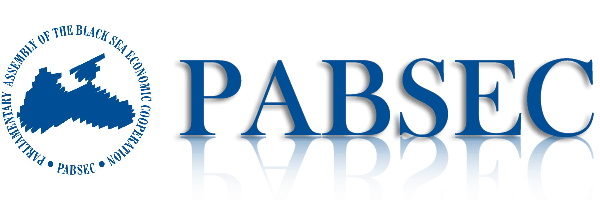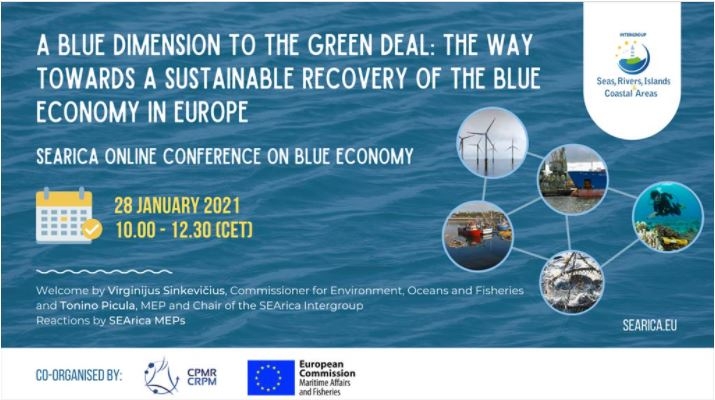Participation of the International Secretariat in the SEARICA Blue Economy Conference “A Blue Dimension to the Green Deal: The Way Towards a Sustainable Recovery of the Blue Economy in Europe”, 28 January 2021
Mr. Fuat Küçükaydın, PABSEC Deputy Secretary General, took part in the SEARICA (Seas, Rivers, Islands and Coastal Areas Intergroup) Blue Economy Conference, which was organized in the format of a videoconference on 28 January 2021.
The online conference concluded the feedback process on the European Commission Roadmap on the sustainable blue economy. Different regional, national and sectoral blue economy stakeholders, Members of the European Parliament and high-level officials of the European Commission took part in the event on the various facets of the blue economy.
In the framework of the discussions, it was underlined the important role of the SEARICA Intergroup in promoting concrete actions to support a comprehensive approach to maritime-related policies. It was noted that the Covid-19 crisis has affected the blue economy and that through a coordinated approach it can recover as a new resilient sector, that takes into account the links between environmental sustainability, maritime industrial policy and transport, research, ocean literacy.
During the discussions, the speakers underlined the need for the European Commission to strengthen its educational programs for maritime knowledge. In order for the blue economy to be successful, the environmental considerations need to be integrated, the citizen engagement and the regional cooperation should be strengthened, and the opportunities offered by new technologies need to be multiplied.
The Seas, Rivers, Islands and Coastal Areas Intergroup was launched in 2010 and for the current European Parliament term brings together 107 MEPs from 23 different Member States and 6 political groups. Relevant EU policies and initiatives related to maritime topics, such as the Blue Growth Strategy and the Framework for Maritime Spatial Planning, coordinated under the Integrated Maritime Policy, as well as the different Sea Basin Strategies and, more recently, the Green Deal, the revamped Industrial Strategy or the new Maritime and Fisheries Fund reflect the EU awareness of the great possibilities offered by the seas and oceans.Mr. Fuat Küçükaydın, PABSEC Deputy Secretary General, took part in the SEARICA (Seas, Rivers, Islands and Coastal Areas Intergroup) Blue Economy Conference, which was organized in the format of a videoconference on 28 January 2021.
The online conference concluded the feedback process on the European Commission Roadmap on the sustainable blue economy. Different regional, national and sectoral blue economy stakeholders, Members of the European Parliament and high-level officials of the European Commission took part in the event on the various facets of the blue economy.
In the framework of the discussions, it was underlined the important role of the SEARICA Intergroup in promoting concrete actions to support a comprehensive approach to maritime-related policies. It was noted that the Covid-19 crisis has affected the blue economy and that through a coordinated approach it can recover as a new resilient sector, that takes into account the links between environmental sustainability, maritime industrial policy and transport, research, ocean literacy.
During the discussions, the speakers underlined the need for the European Commission to strengthen its educational programs for maritime knowledge. In order for the blue economy to be successful, the environmental considerations need to be integrated, the citizen engagement and the regional cooperation should be strengthened, and the opportunities offered by new technologies need to be multiplied.
The Seas, Rivers, Islands and Coastal Areas Intergroup was launched in 2010 and for the current European Parliament term brings together 107 MEPs from 23 different Member States and 6 political groups. Relevant EU policies and initiatives related to maritime topics, such as the Blue Growth Strategy and the Framework for Maritime Spatial Planning, coordinated under the Integrated Maritime Policy, as well as the different Sea Basin Strategies and, more recently, the Green Deal, the revamped Industrial Strategy or the new Maritime and Fisheries Fund reflect the EU awareness of the great possibilities offered by the seas and oceans.

